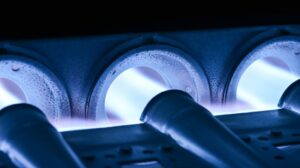
When temperatures drop and you need your heating system to run consistently day after day, saving money can seem like a challenge. After all, HVAC systems take up a large portion of your household energy use (about 50% of all your energy costs for the year), and of course, you’re not going to turn your heater off to save money.
Read on as we reveal some of our top tips for boosting your heating efficiency to save money.
Use a Programmable Thermostat
Using a thermostat where you can set a schedule for your heating is the simplest way to cut back on your utility bills. Today’s programmable thermostats can allow you to make different schedules for different times of the day or night—particularly if you go with a Wi-Fi or smart thermostat.
Smart thermostats enable you to change the temperature and programs, no matter where you are. You can check in on the settings when you’re at work and can make adjustments as needed. Just ensure that you have a qualified and experienced technician install the system for you.
Lower the Temp on the Thermostat
We don’t want you to freeze! But, if you truly want to cut back on your energy costs, you may have to make a small shift in how you set the thermostat. The US Department of Energy recommends that during the winter you set your thermostat to around 68°F. Homeowners are often tempted to go up 5° or higher than that. But lowering the temperature can save you a lot of money.
It’s also important to remember that turning off the heater is actually a bad way to save energy—it doesn’t really save energy well at all. The reason for this is that your heater uses the most energy when it cycles on and off. So if it’s shut off for a few hours or more, it allows your home to get extremely cold, and then your heater has to run more to reach and keep your desired temperature.
Use Additional Means of Heating
Your heating system isn’t the only way to bring warmth into your home. Open the curtains and blinds to south-facing windows in order to bring in some natural radiant heat, hang out near the kitchen when dinner is cooking, and wear lots of layers.
Make Sure Your Home Is Insulated
Having a properly insulated home is key to improving your heating efficiency. Insulation prevents heat transfer—but if you don’t have enough, don’t have the right kind, or if your insulation picks up moisture, then it can’t possibly do its job.
Change the Furnace Air Filter
The air filter, despite what some homeowners believe, is not there to protect indoor air quality. It’s actually there to keep the particles from the indoor air from getting inside the furnace or heating system. If the air filter gets too clogged, it has a negative impact on airflow and as a result, the furnace struggles to heat the air effectively. It forces the heater to run longer, which then in turn wastes energy.
For reliable furnace repair in Shippensburg, PA contact Premier HVAC Services today!

